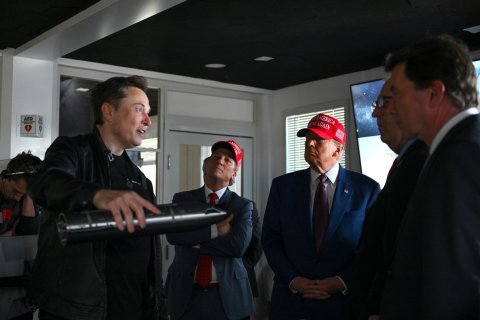A swirl of rumors and debates has taken over social media and news outlets about one major question: Will Elon Musk control NASA? The speculation intensified after comments from various political figures and the continued growth of Musk’s space company, SpaceX. But now, a clear statement from a Trump-era NASA official has put the record straight — and the answer is a firm no.
Let’s unpack what sparked these claims, what’s actually happening with NASA and SpaceX, and why the answer to this burning question may be more nuanced than it seems.
What Sparked the Rumor: Elon Musk and NASA’s Growing Ties
The question, “Will Elon Musk control NASA?” didn’t come out of nowhere. Over the last decade, SpaceX has become one of NASA’s most trusted private partners. From launching astronauts to the International Space Station to providing satellite delivery services, Musk’s company plays a central role in NASA’s plans.
Here are a few reasons the speculation started:
- SpaceX dominance in U.S. space missions: It’s no secret that SpaceX is now the go-to company for many of NASA’s critical launches.
- Budget cuts and privatization trends: Under various administrations, there has been growing support for public-private partnerships in space.
- Elon Musk’s increasing influence: Musk is not just a CEO; he’s a powerful figure who impacts everything from tech to transportation.
With this backdrop, concerns emerged: Is NASA becoming too dependent on Elon Musk?
Trump’s NASA Chief Responds to Control Claims
In an interview aired earlier this week, Jim Bridenstine, the former NASA administrator appointed during the Trump administration, addressed the rumors head-on. When asked directly if Elon Musk was on track to “control” NASA, Bridenstine replied:
“Absolutely not. NASA is a government agency. We work with commercial partners like SpaceX, but control? No, Elon Musk does not and will not control NASA.”
This statement is significant because Bridenstine was the one who pushed for closer ties between NASA and private companies during his term. He championed commercial crew programs and promoted partnerships that allowed companies like SpaceX and Boeing to take the lead in low-Earth orbit operations.
Yet, even he draws a firm line between partnership and control.
NASA’s Role: Still a Government-Run Space Agency

To understand why the idea of Elon Musk controlling NASA is a stretch, it’s important to understand how NASA operates.
NASA is a federal agency, funded by taxpayers and overseen by Congress. Every major project, from moon missions to climate satellites, must pass through layers of approval and accountability.
Here’s how NASA differs from SpaceX:
| NASA | SpaceX |
|---|---|
| Government-funded | Privately owned |
| Reports to Congress | Reports to shareholders |
| Science-focused | Tech/business focused |
| Long-term missions | Agile innovation |
So, while the two work together, NASA isn’t for sale — and certainly not to one person.
The Nature of NASA and SpaceX’s Partnership
Despite the rumors, the reality is simple: NASA needs private companies to get the job done, and SpaceX happens to be the best at it right now.
This doesn’t mean Musk is calling the shots. Instead, NASA acts as the customer, contracting out work to whoever offers the best deal — whether that’s SpaceX, Blue Origin, or Boeing.
Recent Projects Involving SpaceX:
- Commercial Crew Program: SpaceX’s Crew Dragon has been ferrying astronauts to and from the ISS since 2020.
- Artemis Program: NASA selected SpaceX’s Starship to land the next astronauts on the Moon.
- Satellite Launches: NASA frequently contracts SpaceX to launch satellites for Earth observation and research.
These partnerships have been successful because they combine NASA’s science expertise with SpaceX’s efficiency and innovation. But none of this suggests that control has shifted hands.
Critics Still Worry About Over-Reliance
That said, not everyone is at ease with this arrangement.
Some critics warn that NASA is becoming too reliant on SpaceX. If SpaceX is the only company that can deliver on missions, they argue, what happens if it fails or if Musk decides to pull back?
This kind of dependence could create risks:
- Less competition could mean higher costs over time.
- Too much influence from one person or company could sway mission priorities.
- Policy risks if leadership shifts — Musk has been known to disagree with government policies.
Bridenstine acknowledged these risks but added:
“That’s why we continue working with multiple vendors. NASA doesn’t rely on just one company — and it never should.”
Musk’s Vision for Space: Helpful but Different

Elon Musk has always had a bold vision: colonize Mars, build reusable rockets, and make humanity a multiplanetary species. These goals, while inspiring, don’t always match up with NASA’s focus on science and exploration.
NASA, for example, funds climate studies, builds satellites for Earth observation, and trains international astronauts. Musk is more focused on speed, innovation, and grand-scale engineering.
This difference in purpose ensures that even if their goals sometimes align, NASA will always follow a different path than Musk’s private empire.
What’s Next for NASA and SpaceX?
The partnership will likely grow stronger in the coming years, with missions like:
- Artemis III lunar landing (with SpaceX’s Starship).
- Commercial LEO space stations, where private companies will build and operate orbiting labs.
- Continued ISS support and satellite launches.
But these are all under contract. NASA decides the mission, the goals, and the funding. SpaceX is simply the supplier — a very successful one, but a supplier nonetheless.
Final Verdict: Will Elon Musk Control NASA?
The short answer: No, Elon Musk will not control NASA.
Despite the internet buzz, political fearmongering, and Musk’s growing space presence, NASA remains a U.S. government agency. It works with private companies — yes, even depends on them at times — but it does not hand over control.
Bridenstine’s statement is a reassuring reminder: NASA belongs to the people, not any billionaire, no matter how brilliant or influential.
Also Read – How America Is Transitioning to Renewable Energy






